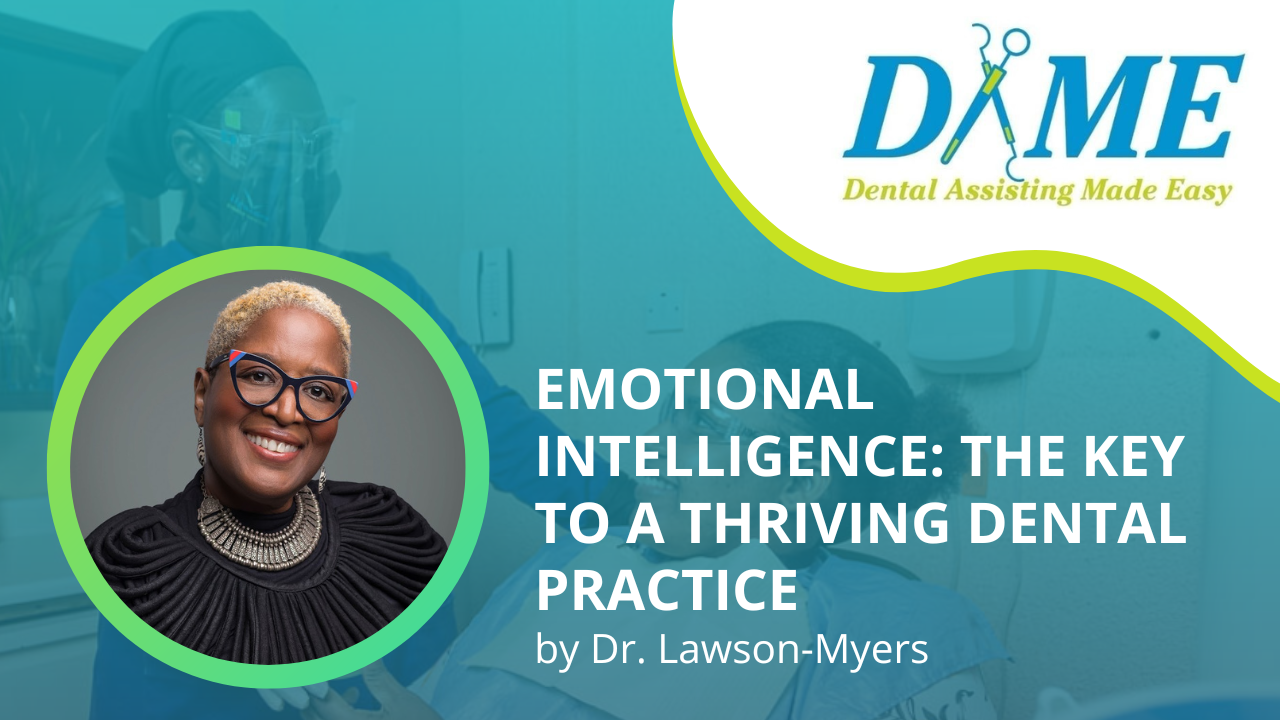Emotional Intelligence: The Key to a Thriving Dental Practice

Managing both patient care and staff dynamics can be challenging.
However, integrating emotional intelligence (EI) into your practice can transform these challenges into opportunities for growth and improvement.
In a recent conversation with Orrin Webb, a renowned emotional intelligence coach, we explored the profound impact of EI on creating a more positive and productive work environment.
Understanding Emotional Intelligence in Dental Practices
Emotional intelligence, often abbreviated as EI, is the ability to recognize, understand, and manage our own emotions, while also being able to recognize, understand, and influence the emotions of others.
In dental practices, EI is crucial not only for effective patient care but also for fostering a healthy workplace environment.
The Pitfalls of Low Emotional Intelligence
Micromanagement is a common issue in workplaces with low EI.
Micromanaging often stems from a lack of trust and communication, leading to assumptions and judgments about an employee's competence. This creates a toxic environment where neither the manager nor the employee can thrive.
In many cases, the root cause of micromanagement is the micromanager's lack of emotional intelligence. They fail to ask questions, understand the reasons behind certain behaviors, or provide the support needed for employees to succeed.
The Role of Psychological Safety
One of the most significant contributions of EI to a workplace is the creation of psychological safety. When team members feel safe to express their thoughts and emotions without fear of negative consequences, they are more likely to be engaged, productive, and innovative.
Google’s research into high-performing teams found that psychological safety is the most critical factor in determining a team's success. This finding underscores the importance of fostering an environment where emotional intelligence is prioritized.
Enhancing Teamwork and Collaboration
By understanding each team member's personality type, strengths, and preferences, dental practices can improve communication and collaboration.
For example, recognizing that a colleague’s seemingly controlling behavior stems from their personality type can shift perceptions and reduce conflicts. Using tools like MBTI, StrengthsFinders, and DISC, teams can develop a common language to discuss personality differences, leading to enhanced teamwork and reduced tension.
Practical Steps to Incorporate Emotional Intelligence
- Self-Awareness: Encourage team members to become aware of their emotional states and how these affect their interactions. Self-awareness is the first step towards emotional intelligence.
- Curiosity Over Judgment: Foster a culture of curiosity. Encourage team members to ask questions and seek to understand their colleagues’ perspectives rather than making assumptions.
- Effective Communication: Promote open and honest communication. Regularly scheduled team meetings and one-on-one check-ins can help identify and address issues before they escalate.
- Training and Development: Invest in emotional intelligence training for your team. Workshops and retreats can provide valuable tools and frameworks for understanding and improving EI.
- Empathy and Support: Develop empathy by encouraging team members to consider each other's feelings and viewpoints. Providing support and understanding during conflicts can lead to more effective resolutions.
Addressing Remote Work Challenges
The rise of remote work has made emotional intelligence even more critical. Without the benefit of face-to-face interactions, it's easy for misunderstandings to arise. It is essential to maintain open lines of communication with remote employees. Regular virtual meetings, personalized check-ins, and team-building activities can help remote workers feel connected and valued.
Applying Emotional Intelligence to Patient Interactions
Emotional intelligence is not just beneficial for internal team dynamics but also for patient interactions. Every patient is unique, and understanding their emotional states can significantly improve their experience. Some patients may express anxiety through anger, while others might be visibly fearful. Recognizing these emotional cues and responding with empathy and support can enhance patient satisfaction and loyalty.
Conclusion
Incorporating emotional intelligence into your dental practice can lead to a more positive, productive, and harmonious work environment.
By fostering self-awareness, encouraging curiosity, improving communication, and investing in training, dental professionals can enhance their teamwork and patient care.
Implement emotional intelligence strategies, and you will see significant improvements in both staff satisfaction and patient outcomes.
Embrace emotional intelligence and watch your dental practice thrive!
. . . . . . . . . . . . . . . . . . . . . . . . . . . . . . . . . . . . . . . . . . . . . . . . . . . . . .
Would you like to LISTEN to this article?
This is Episode 51 of my Irreplaceable Dental Assistant podcast.
CLICK HERE TO LISTEN
. . . . . . . . . . . . . . . . . . . . . . . . . . . . . . . . . . . . . . . . . . . . . . . . . . . . . .


